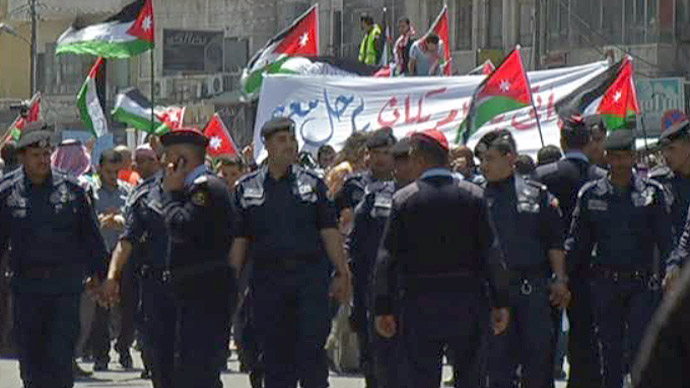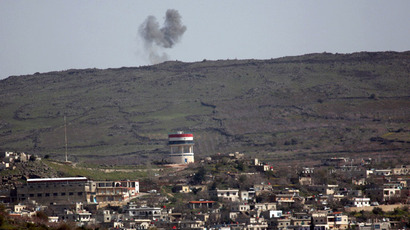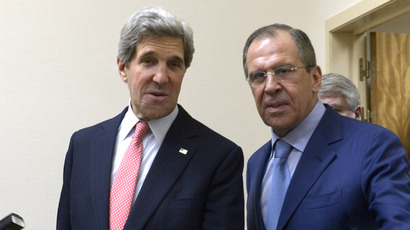Hundreds of Jordanians rally against deployment of US troops to Syrian border (VIDEO)
Three hundred Jordanians have demonstrated against the proposed deployment of 200 US troops on their nation’s border with Syria. The protest comes as Jordanian monarch King Abdullah II meets with US President Barack Obama.
Leftists and independents chanted, “No to US troops in Jordan, this is not in our national interest" during the Friday rally in Amman. Demonstrators also burned US flags in support of Syrian President Bashar Assad. Protesters warned the deployment could be the beginning of a US-led invasion similar to Iraq, which Washington would justify by the supposed need to secure Syria’s chemical weapons.
Although US forces are already stationed in Jordan, the new troops are expected to include specialists in intelligence, operations and logistics. The troops will also include commanding officers who will lay the groundwork for the coordination of a potentially larger deployment, US Defense Secretary Chuck Hagel said.
"Currently, the US forces assisting Jordan are troops pulled from various units and places," Hagel said at a Senate Armed Service Committee meeting earlier this month. He explained that deploying troops that had previously worked together will enhance the unit's efficiency.
Jordan has sent its own reinforcements to guard against the possibility of fighting spilling across the border.
Accusations of Syrian chemical weapons use
The Friday rally comes as the US and Britain maintain that the Syrian army has used chemical weapons. While speaking in Abu Dhabi on Thursday, Hagel said that the US intelligence community has determined “with varying degrees of confidence” that the Syrian regime used the nerve agent sarin “on a small scale.”
Although Syrian officials have denounced the allegations as "lies,” both the US and Britain have not backed down from the accusation. Earlier on Friday, British Prime Minister David Cameron told the BBC that there was “limited” but “growing evidence” that such weapons had been used, probably by government forces.
However, both countries lack solid evidence to prove that the Syrian government used chemical weapons.

Syrian conflict’s effect on Jordan
As the two-year uprising against President Assad continues, neighboring Jordan is faced with the task of sheltering more than 500,000 Syrian refugees.
On Thursday, Jordan called on the UN Security Council to declare the exodus of refugees from Syria a threat to international security, and to organize a visit to the region. In a letter to the Security Council, UN ambassador Prince Zeid al-Hussein said the huge influx of refugees “threatens to security and stability of our country.” He added that between 1,500 and 2,000 people a day are crossing the border, and that Jordan believes the crisis has “implications for international peace and security.”
Jordanians, who already suffer from high unemployment and inflation, have accused the refugees of taking their jobs and blame them for higher rents. The UN High Commissioner expects the number of refugees in Jordan to soar to 1.2 million by the end of 2013, which amounts to a one-fifth of the total population.
Jordan has asked for $850 million in new US aid this year to help the country cope with the flood of refugees.

Jordanian authorities’ appeal to America
Jordania’s King Abdullah II has urged the Obama administration to step up its efforts to broker a political solution to the Syrian conflict.
During meetings with congressional leaders this week, the monarch warned that Syria appears to be headed toward chaos, or a breakup that could endanger the entire region, the Washington Post reported. The king is expected to deliver a similar message in his Friday meeting with President Obama.
Three days ago, US Military officials said that Washington was “working closely with the Jordanians” to establish a specialized command and control headquarters to monitor the violence in Syria.
The headquarters will focus on monitoring Syria’s potential use of chemical weapons, Army and Pentagon officials explained, according to Military.com.
“The situation in Syria is still not quite predictable enough – we’re watching,” Army Chief of Staff Gen. Raymond Odierno said at an April 23 budget hearing.
During a March visit to Jordan, Obama met with King Abdullah II and expressed concerns about Syria becoming an enclave for extremism. A French daily alleged earlier this week that during the meeting, a decision was reached for Jordan to open two air corridors for Israeli drones to monitor the Syrian conflict.
A Jordanian official told RT Arabic that the report was “inaccurate and groundless.”














